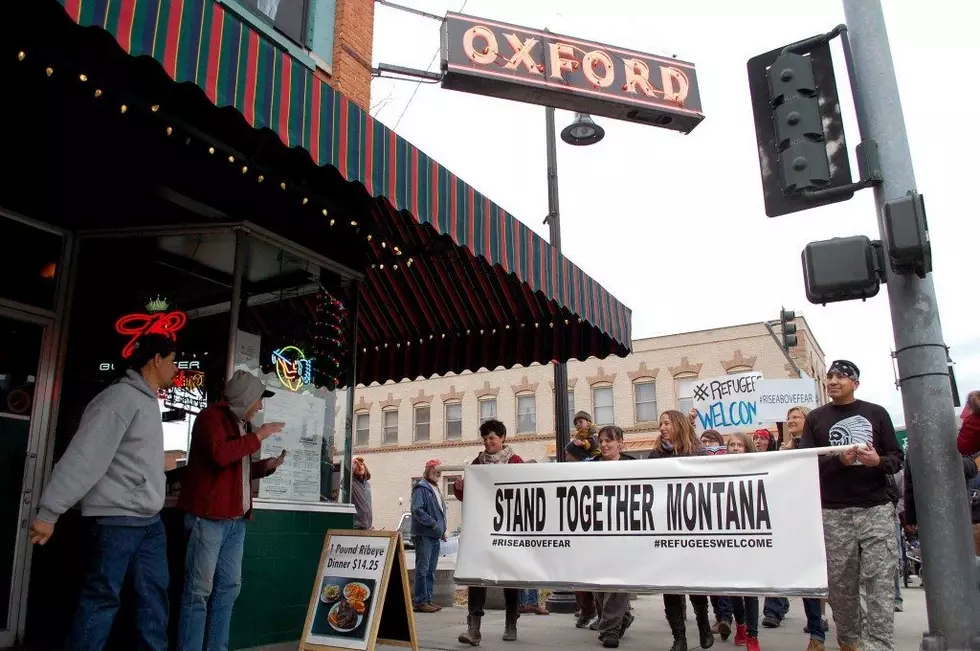
Missoula stands against hate in rally for refugees
By Martin Kidston/MISSOULA CURRENT
For the 20 years Jameel Chaudhry has lived in Montana, he has paid his taxes, raised his children, and made a living working as an architect. He has endured slurs – rag head, terrorist and worse – and listened as the drumbeat of hateful rhetoric grows louder on the swell of fear and America's unsavory race for president.
Chaudhry, an immigrant from east Africa, kept quiet until Tuesday night when he stepped upon a stage in downtown Missoula and greeted a crowd of 1,000 people with a cheerful as-salamu alaykum.
He is not a public speaker, he admitted, but even so, he had much to say.
“There are some folks in this country and this state who want to limit immigration, deny entry to refugees, and even block any Muslims from entering America,” he said in a soft but sure voice. “It's divisive politics that goes against everything this country was built on. American is a land of immigrants.”
What began as a gathering organized on social media ended Tuesday night with a march on Caras Park. There, in a show of song and candle-lit reflection, a groundswell of Missoulians made a stand against bigotry and hate. The atmosphere verged on celebration as they rolled out the welcome mat to the world's refugees and shunned race, religion or place of origin as qualifying factors.
Having waited months for the moment, their message of peace and love resounded across the state, where events of varying sizes played out in Helena, Bozeman, Billings and Kalispell. As one participant noted, Montanans are no longer willing to stand quietly by and let a fearful minority speak on their behalf.
“The hateful rhetoric has continued on and on, and now it's time to say statewide that Montana doesn't stand for those kind of values,” Micah Nielsen said before the rally. “It's easy to say the side of peace is winning on this particular issue.”
As participants hoisted signs reading “compassion has no boarders” and “my Montana includes Muslims,” members of Soft Landing Missoula quietly continued their efforts to reopen a refugee resettlement office in the Garden City.
Backed by hundreds of citizens and supported by local elected leaders, the group is working with the International Rescue Committee and the U.S. Department of State to resettle up to 100 refugees in Missoula.
It wouldn't be anything new. The city was home to a refugee office from 1979 to 2008. During that span, the IRC helped locate Hmong and eastern European refugees to Missoula, and the city became more diverse because of it.
Yet despite the city's history of accommodating refugees – however few in number – the idea of accepting Syrian refugees and Muslims in particular has fueled a backlash from some on the right.
Both Sen. Steve Daines and Rep. Ryan Zinke oppose allowing Syrian refugees into the U.S. Hundreds of protesters in Hamilton, Missoula and Helena have argued the same in recent weeks, going so far as to brand those fleeing the carnage of a protracted Syrian war as rapists and terrorists.
Betsy Mulligan-Dague, executive director of the Jeannette Rankin Peace Center, is well aware of the controversy. The effort by Soft Landing has thrust Missoula into a national debate on refugees, one that has found its way into presidential politics and the chambers of the U.S. Congress.
“We will not resolve the conflict by focusing on what or who is right, or using labels, making judgments or demonizing anyone,” Mulligan-Dague told the crowd. “What makes a community whole is the love they share. This is our task today and in the days ahead. We are hundreds standing together all across Montana.”
Reading his notes and considering his words, Chaudhry shared his own challenges as an immigrant to the U.S. It played as a common theme throughout the evening, with speaker after speaker recounting their family's immigrant history.
Missoula Mayor John Engen said his mother's first language wasn't English – it was Norwegian. Like so many in the crowd, he is one generation removed from immigrants arriving by boat in hopes of building a better life.
Laurie Franklin, a community faith leader, shared a similar story of her own father. He was a child when his family fled religious persecution and violence in Ukraine and arrived at Ellis Island.
“We learned that we too must be good to the stranger,” said Franklin. “We know what it is to be outsiders, to be persecuted for our strange customs, language and beliefs. We cannot look on in silence when the need is great and when people suffer.”
Since the civil war began in Syria, an estimated 320,000 people have been killed and 1.5 million wounded or disabled, according to the Syrian Observatory for Human Rights. An estimated 6.6 million people are displaced within Syria. Another 4 million have fled as refugees – a number four times the population of Montana.
Those who gathered Tuesday night spoke of the Syrian conflict and America's moral obligation to accommodate those who suffer. It is, they said, an obligation born by all.
“I support a proposal to bring some of those refugees to this valley, if that's possible at all,” said Chaudhry. “These people are suffering in the worst possible way. They are human beings.”
Through the flickering candles, banners and signs reading “#refugeeswelcome,” those Missoulians without a fancy title or a platform from which to speak took their place in the march and found strength in numbers.
“This is really Missoula right here,” said Dustin Monroe, who helped lead the march through downtown Missoula. “It really gives people a voice.”
